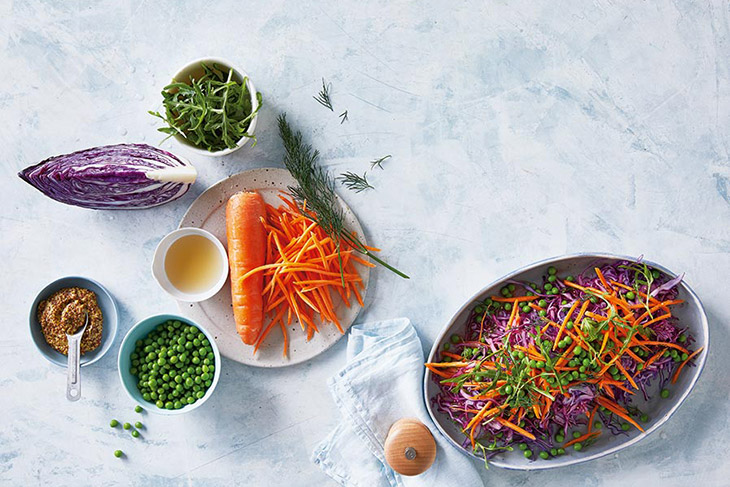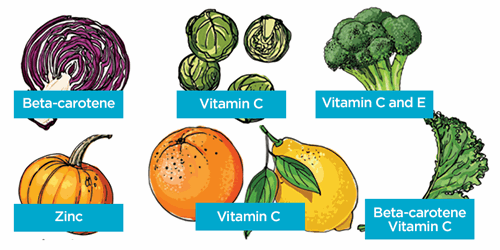Can I boost my immune system through diet?

It's an enticing idea: Eat these vitamins, herbs, or specific foods, and your body will be better prepared to stave off infection.
But is it true? Can we boost the immune system to work better against disease?
The disappointing truth about diet and immune function is that there is no evidence that any specific vitamin or type of food will enhance your immune response. Like everything else when it comes to our complicated bodies, the immune system is intricate and difficult to study.
Want to learn more? Check out our guide to diet, exercise and the immune system.
However, there are plenty of things you can do to prepare your body for the flu season (or pandemics!) People who are overall healthy usually have an optimal immune response. By maintaining good health, you may be able to avoid getting sick or recover more quickly from illness.
Improving your overall health gets even more important as you grow older, as the immune system tends to get weaker with age.
All the tips below work together to improve your health, so you'll get a cumulative health boost as you cross a few off your list. For example, drinking less may help you sleep better, which together helps your body restore itself. Add in a little exercise every day and your sleep patterns may improve further.
Frequently washing hands
The number one thing you can do to avoid getting sick is to wash your hands frequently. If you don't come in contact with disease, you can't contract it, simple as that!
Washing your hands with warm water and soap should always be your number one method of disinfection (learn the WHO technique here). If no sink with soap is available, a hand sanitiser with at least 60 percent alcohol will do as a stopgap measure.
If you work in a shared space with others, also remember to regularly clean your work surfaces!
Eat a nutritious and balanced diet
Being healthy in general means eating a nutritious and varied diet. While we don't know of any single foods that will boost your immune function, we know a healthy diet leads to a healthy body which leads to a healthy immune system.
By eating plenty of fresh fruit and vegetables, you ensure you get all the different vitamins and minerals that your body and immune system requires to work well.
You may also want to take a look at our Gut Health Guide which shows what foods you should eat to improve your gut function – which is one of the body's safety barriers against infection.

Maintain a healthy weight
Obesity leads to chronic low-grade inflammation which is known to impair the immune system. Being overweight can also lead to type 2 diabetes and lung and heart disease, which are conditions known to complicate infections.
The good news is that losing just a small amount of weight – even as little as 5 percent – significantly improves your health and your inflammation levels.
Exercise regularly
Adults should get 150 minutes of moderate aerobic activity such as walking, gardening or cycling per week. Or, if you can step up the pace a little, do 75 minutes of vigorous activity such as running or fast swimming per week.
If you're older and this amount of training seems insurmountable, some exercise is always better than no exercise.
A bonus effect of exercise is that it can help with the next two item on the list: stress and sleep.
Decrease your stress levels
Try to decrease your stress levels. Obviously this is easier said than done, and stress means different things to different people. Exercise is a stress reliever for some, while others get anxious just thinking about a sweaty gym floor. Some prefer to de-stress with a cup of tea and a book, while others get itchy after sitting still for a few minutes.
If you can identify your sources of stress and try to deal with them your overall health – and immune system – will thank you for it.
Get enough sleep
For most, enough sleep means 7 to 9 hours per night. Your body needs time to restore itself and this is best done while you are sleeping. If you struggle with an infection, the body works more effectively against it while you're snoozing.
Drink in moderation
While we may not know of any magic potions to boost our immune system, we do know that excessive alcohol intake reduces the body's defence against infections.
The Australian government's advice on alcohol is straightforward: alcohol is never completely safe, and the more you drink, the greater the risks to your health.
If you like finishing your day with a beer or a glass of wine, limit your intake to 10 units of alcohol per week, and never more than four units on any one day. It's also a good idea to have several alcohol-free days every week.
Quit smoking
Finally, if you're smoking, it's time to quit. Your lungs and airways have trap doors and safety valves which are designed to deal with infection. These won't work as well if you smoke – and even light smoking will have a negative effect on their function.


